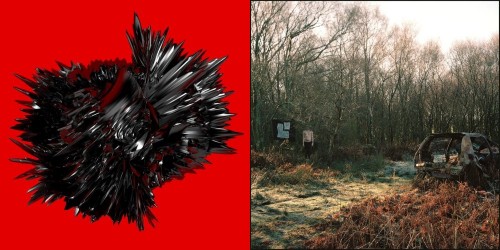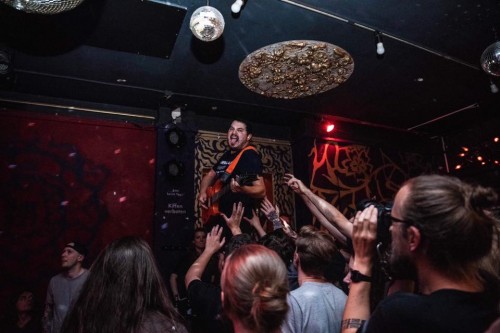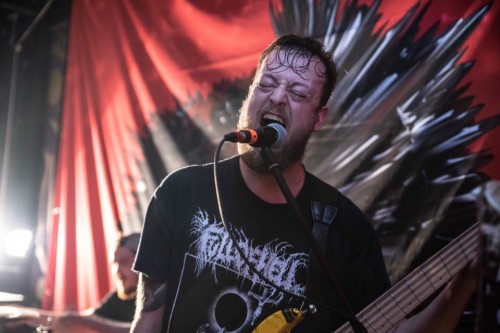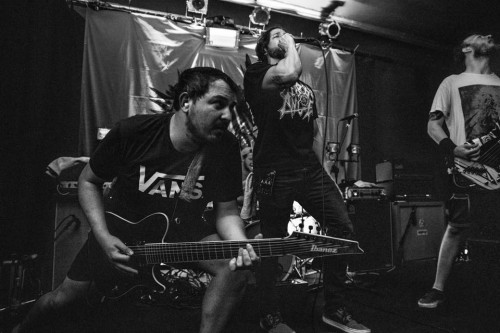Frontierer interview (07/2019)

| With: | Pedram Valiani, Calum Craig |
| Conducted by: | RaduP |
| Published: | 20.07.2019 |
It's usually weird going to a festival where you only care about one or two bands, but this was the case when I decided to sacrifice my sleep by staying in a tent for two nights in a row just to see Frontierer (and Ministry). Frontierer and Sectioned have been some of my favorite discoveries of last year regarding mathcore, so obviously I jumped at the opportunity of talking with the mastermind behind both projects. So in between drunk punks, a techno stage and a metal one, we tried to find a quiet enough spot for the interview.
Radu: Okay, so - how do you juggle between making music for both of your bands? What are the creative process differences between writing for Frontierer and for Sectioned?
Pedram: Ah? If I'm honest with you, the projects are very similar. They kind of overlap in a way. It's just that I'm achieving different goals with slightly different techniques, generally speaking; like the Frontierer music tends to be a bit slower, a bit more rhythmic, and the Sectioned music that we've been going for, it's a bit more about the speed, a bit more punk rock, a bit more? It's a different type of intensity. It's more about the speed.
I guess that's probably the biggest difference, is when I'm starting to write a song for Sectioned, the tempo generally tends to be higher, or at least on the last record it did, but that may change moving forward. It's a really general thing, but that tends to be the style.
Radu: So when you start writing, you know what band the song will be for?
Pedram: No - Yeah, I mean, I write for the band specifically at the time. I don't write a song and then assign it to a certain band. I write for that band in the first place.
Radu: Okay. Frontierer started out as just you and Chad and now is slowly expanding the lineup. Unloved is your first album with the full band. How is the making of this album different because of that?
Pedram: It's not. It's the same process. I wrote all the music, Chad did all the vocals. He sent me all his recorded vocals and then basically we had a finished product from there. It went to mastering and then that was the record. The guys don't really input on the writing side of things. When we play live, they have a bit of an input in terms of we gotta change things up a bit -
*somebody in the background yells with intoxicated delight*
Pedram: Someone's having a party over there. We change things up a bit live and sometimes the guys have a bit of an input there in the practice space. I don't know where that will go moving forward, but at the moment I've very much got a lot of good creative ideas that I'd want to get out first before we continue moving onto further material as a band.
Radu: Okay. Sectioned also had a lineup change with its resurrection. Why did Sectioned reunite, and why in this form?
Pedram: [To Calum] I'll let you take that.
Calum Craig: When the old lineup, as I understand it - I wasn't part of the old lineup of Sectioned, but I knew all the guys separately - they went on one tour, found out that they didn't really get on, so, uh, that imploded. From the ashes of that came Pedram and Owen, continued to collaborate, started Frontierer, and then when Sectioned rose again? [to Pedram] I guess you thought, "If it isn't broken, don't fix it." We've got four musicians here who get on really well and who play really well together, who know the process, so let's go with that. Let's just keep going with the same combination.
Pedram: The thing that you're going to hear the most difference is in the vocals, so it didn't really make sense to change instrumentally a lineup of people who got on for the sake of -
Radu: Making music.
Pedram: Yeah, yeah. It worked. More practical.
Radu: Okay. Both Sectioned and Frontierer released full-length albums in the same year, which had both of them nominated for Best Djent/Math Album of 2018 in our Metal Storm Awards. Why did you choose to release both of them so closely to each other?
Pedram: I didn't really want to hold onto them, and at the same time I wanted to release two records in the same year as an experiment for myself to see how they would be judged, how people would view the music, if they'd view differences, how they'd view them?
Radu: What were the differences?
Pedram: There were some overlaps and some things totally different. In terms of the response? I dunno. The Sectioned stuff has a bit more of a cult following than the Frontierer stuff in terms of who picks it up and whatnot. It's more responsive in different scenes, like crust and punk circles, whereas Frontierer does better in mathcore groups and stuff, and yet somehow the two of them get picked up in some places that are common to both.
Radu: Was there much difficulty translating your album material to a live setting?
Calum: A fair amount, yeah. Pedram doesn't really write like any other musician. In a lot of ways he's not a standard musician; there's not a lot of things that come out that you would expect from standard songwriting, so, yeah, it was a bit of a struggle to? I couldn't envision how it would translate live at all, because it wasn't written with that in mind, but when we finally all got in a room together we learned our individual parts, and I saw - I was living abroad at the time - I saw a video of the three of them rehearsing together, and that was the first time when I was like, suddenly it was just like, "Oh, shit. There it is." Suddenly it just clicked and we could see how it was going to sound live.
Radu: Is Frontierer missing out on anything by staying independent? Is creative control something that you would lose with most label contracts?
Pedram: I'll answer the second one first. Yes and no; depends on your contract. I think nowadays most record labels are wising up to the fact that it's a very easy thing for them to let go or let the artist feel like they have more control in order to sign them in an age where their music is much more accessible online and in other platforms, so from the record label's point of view, if they're giving the artist a bit more of the creative control, which the view is traditionally something that's quite taboo to touch, then it will attract more artists.
Do I think we're being disadvantaged being independent? No. I think there's plenty other bands who have gone to major labels who have gone back and they do their stuff independently, or big indie labels and went back and they do things independently. I think the thing is we just didn't want to give too much up too early in the growth and development of our band. It might not always be an independent thing. Increasingly, we are? It depends how you define "independent." If you mean solely on our record label's terms, then? I don't really know. I know that we're just writing music and I know that "independent" in the sense that are the five band members the ones contributing everything to keep it going? No, because we have an increasingly growing number of crew members who come into our team who are helping it grow as well, so as that begins to expand, in that sense we become less independent.
Radu: One thing that made your music so interesting was the occasional inclusion of nonmetal influences in the music. How did those come to be and how do you approach those?
Pedram: It's just part and parcel of writing music for me. It's not overthought. I love that Disturbed fuckin' hook in the background [referring to the dance remix of "Down With The Sickness" playing in the venue].
Calum: All weekend the band have just been going, "Ow-wa-ah-ah-ah!" to each other.
Pedram: Yeah, that was perfect, hearing that over a club beat. Sorry. Eh? yeah, going back to that point, you were asking me how do I incorporate the electronic stuff, I love a lot of drum and bass, jungle, breakbeat-type stuff, artists like Aphex Twin, Venetian Snares, stuff like that, Flying Lotus, anything off Brainfeeder. I listen to that sort of stuff as much as I listen to metal, so it's just a natural thing to incorporate that into our sound, so it's not overthought in any way. It's not forced.
Radu: Have you considered starting a nonmetal project? What genre would it be?
Pedram: I have; I've done it. I have a post-rock band called We. We released an album -
Radu: "We"?
Pedram: Yeah, yeah. Two EPs, a single? quite a few years ago, but it's still on Bandcamp. Here is the address [Ed: he actually spells it out]. Yeah, just "We," "W-E." Really hard to find on Spotify, because it's two letters. It's good fun. Started as kind of a piss-take approach to a post-rock project with a friend of mine from Scotland and we just met up every now and then and wrote some songs, and it turned out that we could write some really cool, interesting ambient stuff that we liked, so, yeah, it's been done, and it might continue into the future as well.
Radu: Okay. Uh? *coughs for, like, the fourth time* Sorry, I have something in my neck.
Pedram: 's all right.
Radu: Meshuggah is the one band that is seen as quintessential in pioneering math and djent, but is their role in the development of these genres overestimated? What other originators should be given more credit?
Calum: That's a big question. "Djent" is a bit of a contentious term, I think, and it's being -
Pedram: It's a negative connotation.
Calum: It does, yeah, it certainly has negative connotations now, and? I don't know. Djent just seemed to be a parody of itself from the beginning. Meshuggah have been around since the early '90s. Meshuggah have just been doing their own thing since then. I don't think they've been concerned with current trends in music. They've been doing the same thing incredibly well since? when was the first album released? '93, '94?
Pedram: Maybe a little before -
Radu: '91.
Calum: '91, the first album? Fuck, yeah, so -
Pedram: I was a year old.
Calum: But I think because they're still doing the same thing, they continue to be relevant and they continue to be an influence on everyone, almost everyone that's doing anything that involves low-tuned guitars, chuggy open-string riffs, and odd time signatures.
Radu: Okay.
Pedram: For me, all the music I write is just plagiarizing my favorite bands, sticking them together, and making a record out of it. It's bands like Tony Danza, it's bands like Converge, it's bands like Dillinger, Gaza, The Chariot, but then it's stuff like Aphex Twin, it's stuff like Venetian Snares, as I said, Hyperdub Records, I think of Hyperdub - Burial, et cetera - all that sort of stuff, and I'm just like, "Cool, let's just take the best bits of those, make sure they flow together in a track, and see what comes out," and that's basically it. I don't claim any originality with anything I do.
Radu: If somebody was to make a Meshuggah tribute record and you would have to cover a song on it, which one would it be?
Pedram: Actually? probably, for me, "Straws Pulled At Random" is probably one of my favorite songs.
Calum: Fuck, I don't know! *laughs* What would be a good one? I don't know, maybe, like, "I Am Colossus."
Radu: Okay. If you had to guess, why is Frontierer making such a big buzz in the metal world, and why is everyone blown away by how heavy you are?
Pedram: I have no fuckin' idea, and I don't even know if it is. I mean, I don't know, we released the first album, it's - all of the feedback we've had over the last, like, four years or whatever has been insane. It's enabled us to do stuff like go on tours and things, bring Chad over from the States. There is not a secret formula or recipe; it's just a case of making smart decisions. Not to do with the music, necessarily, to do with the logistics of the band, how we operate, how everybody else brings in their own view and opinion on how we operate together. That's my view. Calum might see that differently, but?
Calum: Right, yeah. I think because Pedram's production style just is a big-arse wall of sound and a shitload of distortion and it's that real boot-to-the-head sound, which? the only other bands I can think are doing that sort of thing just now are, like? A lot of bands are recording with GodCity [Studios] and I think it was well-timed. People are looking for a new -
Radu: A new sound.
Calum: A new odd tempo, energetic live shows, live sound, with - yeah, it just seems to have come along at a right time, I guess. I think it's a combination of savvy - I don't want to say, "marketing," but -
Pedram: Put yourself in the right place at the right time with the right people given the right set of circumstances - I mean, it's like calculated risk to a degree, but it's not like we're maneuvering ourselves in that position. We have what we have. We just seem to be in the right places, we seem to know that certain online forums and platforms exist that can facilitate the growth of what it is that we do, so a part of it is that sort of strategy.
Radu: Seeing you on the same stage as a more straightforward punk band, The Casualties, reminds me of how large an umbrella term "punk" really is. How much are you into other branches of punk other than mathcore [Ed: implying that mathcore is punk]? Do you like '80s hardcore, post-punk, pop punk?
Pedram: Stuff like Fugazi I dig. But then I don't know how far back it would really go for me. How about you [to Calum]?
Calum: I grew up with '90s Bay Area pop punk, listening to blink-182 and Green Day, so that was my introduction to punk. Pretty soft introduction. I like some, I got into The Clash and Stiff Little Fingers as well, but I wouldn't say punk's a massive influence. Punk's there. Punk's influence is felt in all music, in all modern music today, and it's funny hearing the transition into hardcore. Once you get into hardcore, you can more clearly hear a link to what we do now and what a lot of other heavier bands are doing, but it's all connected in that lineage there.
Radu: So it's not direct influence, but influence that runs through other stuff.
Calum: Yeah. Peripheral influence.
Pedram: For me, I think it's purely looking at the techniques and the writing that are used in pop-punk, the different types of rhythms, the d-beats, all the sort of stuff that makes a punk song, taking again the aspects of that and popping it into something that we want to do. There are some modern-day punk bands that are absolutely killing it, one of them being The Armed from Michigan in the States. Calum recently toured with them. He was the sort of Green Goblin, if you'd call it that, the guy in the ghillie suit. He had a great time and I love those guys. They're fantastic and they're really pushing what pop-punk is in today's terms, which is phenomenal given the length of time that genre has been kicking about for.
Radu: What's a genre of music that we wouldn't be able to guess that you're into?
Pedram: Well, my first concert was a Diana Ross concert with my mom when I was, like, 11 years old - not that I'm into Diana Ross, but there's a fun fact for your interview if you wanted it.
Radu: Nice.
Pedram: I don't know. I listen to some Middle Eastern music as well, as I'm half-Iranian, so I have some sort of connection to my roots there. I listen to some Persian music a bit, but not a lot of other stuff I can think of.
Calum: I really like Lady Gaga.
Radu: That's a patrician choice.
Calum: Some of the best-written, best-produced pop around.
Pedram: Yeah, I love it. Her first album is sick.
Radu: So far, both Frontierer videos that I've seen were edited from your performances. If you could work with any director for a big-budget music video, who would it be?
Pedram: Uh? Oh, God, I have no idea.
Calum: Big-budget music video director?
Pedram: To tell you the truth? This is the thing -
Radu: It could be a video director or it could be a movie director.
Pedram: Rob Zombie.
Calum: Yes, actually. Cool as shit.
Pedram: Yeah, Rob Zombie. Let's just stick with Rob Zombie right now.
Radu: Final answer?
Pedram: Yeah, go for it.
Calum: Yeah.
Radu: Anything else you'd like to add?
Pedram: Nah, just thank you very much for coming out tonight and thank you for the interview opportunity and, yeah, we look forward to coming back to Romania again some time soon. It's a really interesting country.
Radu: Thank you.
 | Posted on 20.07.2019 by Doesn't matter that much to me if you agree with me, as long as you checked the album out. |
Comments
Comments: 1
Visited by: 32 users
| VIG Account deleted |
Hits total: 3484 | This month: 9







